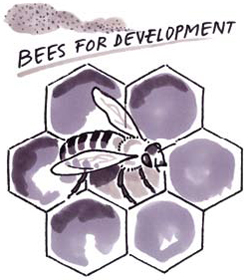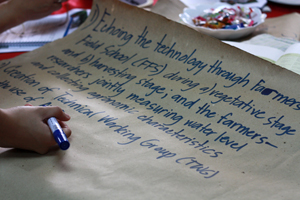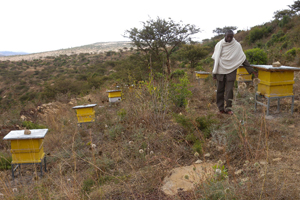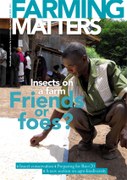AUTHOR
March 2012
Articles
Agro-biodiversity @knowledged
March 14th, 2012
Biodiversity is important for the resilience of our planet. Smallholders depend on biodiversity for their livelihoods and survival, and they are its main guardians. Farming practices which use and enhance this diversity are common, yet agriculture can also be the greatest destroyer of biodiversity. Can we add insights and evidence to the debates? This is … Read more
Call for articles: Farmers and their organisations
March 14th, 2012
Deadline: June 1st, 2012 All over the world farmers work together, in both formal and informal settings. Collective action can help farmers to have their voices heard in the political and commercial arena, to minimise risks, to strengthen their capacities and to secure property rights – all extremely challenging things for individuals to achieve working … Read more
Editorial – The bees’ message to Rio
March 14th, 2012
Ask a person (a farmer, an agrochemical vendor, an extension worker or a scientist) what she thinks of the role of insects in agriculture, and you will quickly learn about that person’s perspective on agriculture and ecology. Fear of insects is widespread, and based on an incomplete or distorted understanding of what insects do in … Read more
 Theme overview – Insects, farmers and farm management
March 14th, 2012
Theme overview – Insects, farmers and farm management
March 14th, 2012
Insects can be seen as one of the components of an agro-ecosystem. Yet farming has a strong influence on the population balance between different insect species: it helps some multiply exponentially by increasing quantities of a species’ preferred or reduces their presence with the of pesticides. Alternative agricultural approaches show that farmers can manage a … Read more
 Learning about … All you need to know about bees
March 14th, 2012
Learning about … All you need to know about bees
March 14th, 2012
Honey is probably the first association that comes to mind when we hear the word “bee”. Humans’ appreciation of this sweet product goes back thousands of years. Yet, in a recent conversation with Elizabeth McLeod, Project Officer at Bees for Development, she reminded us of at least two aspects of bees that people often tend … Read more
Opinion: Goodbye bees – and thanks!
March 14th, 2012
Honey bees are amazing creatures, but they are dying by the millions. John Wightman looks at our slow reaction to their disappearance, calling for someone to apply slow response thought processes so as to search for a global solutions. Quoting Einstein, if the bee disappears from the surface of the globe, then man would only … Read more
 Knowledge management within IFAD: Training the trainers
March 14th, 2012
Knowledge management within IFAD: Training the trainers
March 14th, 2012
In April 2010, IFAD and FAO launched a joint programme to provide people working on poverty reduction projects, with the skills and tools required to gather and share knowledge gleaned from their projects. Different workshops in knowledge sharing techniques, writing effectively for different audiences, and systematisation were held in 2011. The last meeting was a … Read more
 Sustainable family farming needs recognition
March 14th, 2012
Sustainable family farming needs recognition
March 14th, 2012
Twenty years ago, the first global conference on Sustainable Development in Rio de Janeiro became a milestone, and there are high hopes that Rio+20 will be an even more significant event. In the previous issue of Farming Matters we introduced Rio+20. Since then, the complex preparations for the conference have been continuing. In January, the … Read more
 A farmer-driven programme to reinforce advocacy capacity
March 14th, 2012
A farmer-driven programme to reinforce advocacy capacity
March 14th, 2012
The Empowering Smallholder Farmers in Markets (ESFIM) initiative is a farmer-driven research and policy development programme that started in June 2008. Its overall objective is to generate demand-driven action research that supports the policy activities of farmers’ organisations. By helping to create an enabling policy and regulatory environment, and more effective economic organisations and institutions, … Read more
 Locally rooted: Ideas and initiatives form the field
March 14th, 2012
Locally rooted: Ideas and initiatives form the field
March 14th, 2012
Insects are one of the many components of an agro-ecosystem. Their presence can lead to severe farm losses, yet they also make many beneficial contributions. Research and experimentation at a local level can help us identify ways to restore the balance between the different components, and so enhance ecosystem resilience – and yields. Iran: Neem … Read more
March 2012
Biodiversity is important for the resilience of our planet. Smallholders depend on biodiversity for their livelihoods and survival, and they are its main guardians. Farming practices which use and enhance this diversity are common, yet agriculture can also be the greatest destroyer of biodiversity. Can we add insights and evidence to the debates? This is … Read more
Deadline: June 1st, 2012 All over the world farmers work together, in both formal and informal settings. Collective action can help farmers to have their voices heard in the political and commercial arena, to minimise risks, to strengthen their capacities and to secure property rights – all extremely challenging things for individuals to achieve working … Read more
Ask a person (a farmer, an agrochemical vendor, an extension worker or a scientist) what she thinks of the role of insects in agriculture, and you will quickly learn about that person’s perspective on agriculture and ecology. Fear of insects is widespread, and based on an incomplete or distorted understanding of what insects do in … Read more
 Theme overview – Insects, farmers and farm management
Theme overview – Insects, farmers and farm management
Insects can be seen as one of the components of an agro-ecosystem. Yet farming has a strong influence on the population balance between different insect species: it helps some multiply exponentially by increasing quantities of a species’ preferred or reduces their presence with the of pesticides. Alternative agricultural approaches show that farmers can manage a … Read more
 Learning about … All you need to know about bees
Learning about … All you need to know about bees
Honey is probably the first association that comes to mind when we hear the word “bee”. Humans’ appreciation of this sweet product goes back thousands of years. Yet, in a recent conversation with Elizabeth McLeod, Project Officer at Bees for Development, she reminded us of at least two aspects of bees that people often tend … Read more
Honey bees are amazing creatures, but they are dying by the millions. John Wightman looks at our slow reaction to their disappearance, calling for someone to apply slow response thought processes so as to search for a global solutions. Quoting Einstein, if the bee disappears from the surface of the globe, then man would only … Read more
 Knowledge management within IFAD: Training the trainers
Knowledge management within IFAD: Training the trainers
In April 2010, IFAD and FAO launched a joint programme to provide people working on poverty reduction projects, with the skills and tools required to gather and share knowledge gleaned from their projects. Different workshops in knowledge sharing techniques, writing effectively for different audiences, and systematisation were held in 2011. The last meeting was a … Read more
 Sustainable family farming needs recognition
Sustainable family farming needs recognition
Twenty years ago, the first global conference on Sustainable Development in Rio de Janeiro became a milestone, and there are high hopes that Rio+20 will be an even more significant event. In the previous issue of Farming Matters we introduced Rio+20. Since then, the complex preparations for the conference have been continuing. In January, the … Read more
 A farmer-driven programme to reinforce advocacy capacity
A farmer-driven programme to reinforce advocacy capacity
The Empowering Smallholder Farmers in Markets (ESFIM) initiative is a farmer-driven research and policy development programme that started in June 2008. Its overall objective is to generate demand-driven action research that supports the policy activities of farmers’ organisations. By helping to create an enabling policy and regulatory environment, and more effective economic organisations and institutions, … Read more
 Locally rooted: Ideas and initiatives form the field
Locally rooted: Ideas and initiatives form the field
Insects are one of the many components of an agro-ecosystem. Their presence can lead to severe farm losses, yet they also make many beneficial contributions. Research and experimentation at a local level can help us identify ways to restore the balance between the different components, and so enhance ecosystem resilience – and yields. Iran: Neem … Read more

